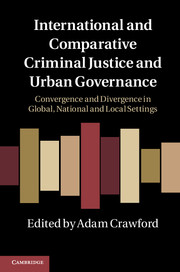 International and Comparative Criminal Justice and Urban Governance
International and Comparative Criminal Justice and Urban Governance from PART 3 - Comparative crime control and urban governance
Published online by Cambridge University Press: 05 June 2011
To govern a problem such as ‘urban safety’, we first need to visualise it and name it. And any act of visualisation employs a particular scale – whether or not the scale is consciously chosen out of a set, or whether one simply takes up a certain scale without considering alternatives. A crucial insight of recent work on space and governance is that scale-effects pervade all visualisation, not just cartography and other two-dimensional representations. Standing on a mountain top to look down at one's town, for instance, one is using a different scale than that employed in – or as some scholars would put it, constituted by – walking down one's street. Scale is thus a fundamental feature or component of all efforts to render the world in thought.
In empirical social science, particularly in survey-based research, the terms ‘scale’ and ‘scaling’ are by no means absent. When researchers ponder whether they should assign numbers to the multiple-choice answers to a question or whether it is best to use qualitative terms such as ‘occasionally’ and ‘frequently’, they say they are thinking about ‘scaling’. Scaling in this sense is an issue that requires thought because even when questions have been written in such a way as to discourage ambiguity and creativity among respondents, anything more complicated than a yes-or-no answer requires paying attention to the implications of how responses are ‘scaled’.
To save this book to your Kindle, first ensure no-reply@cambridge.org is added to your Approved Personal Document E-mail List under your Personal Document Settings on the Manage Your Content and Devices page of your Amazon account. Then enter the ‘name’ part of your Kindle email address below. Find out more about saving to your Kindle.
Note you can select to save to either the @free.kindle.com or @kindle.com variations. ‘@free.kindle.com’ emails are free but can only be saved to your device when it is connected to wi-fi. ‘@kindle.com’ emails can be delivered even when you are not connected to wi-fi, but note that service fees apply.
Find out more about the Kindle Personal Document Service.
To save content items to your account, please confirm that you agree to abide by our usage policies. If this is the first time you use this feature, you will be asked to authorise Cambridge Core to connect with your account. Find out more about saving content to Dropbox.
To save content items to your account, please confirm that you agree to abide by our usage policies. If this is the first time you use this feature, you will be asked to authorise Cambridge Core to connect with your account. Find out more about saving content to Google Drive.